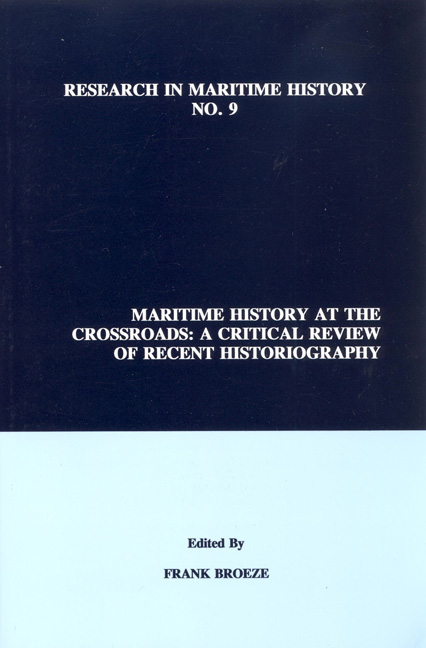Book contents
- Frontmatter
- Contents
- About the Editor
- Introduction
- Contributors
- “Maritime History in Australia”
- “The Enterprising Canadians: An Assessment of Canadian Maritime History since 1975”
- “The Historiography of Maritime China since c. 1975”
- “Danish Maritime History, 1976-1992: A Review”
- “German Maritime Historical Research since 1970: A Critical Survey”
- “The Maritime Historiography of Greece in Recent Decades”
- “Ibero-American Maritime History: Recent Advances in Research, 1975-1994”
- “Indian Maritime Historiography: West Coast Merchants in a Globalizing Economy”
- “Recent Developments in the Historiography of Maritime History in the Netherlands”
- “The Ottoman Empire: Recent Research on Shipping and Shipbuilding in the Sixteenth to Nineteenth Centuries”
- “The Progress of Maritime History in Spain since 1975”
- “Oceanic Historiography: The American Dimension”
“Danish Maritime History, 1976-1992: A Review”
from Contributors
- Frontmatter
- Contents
- About the Editor
- Introduction
- Contributors
- “Maritime History in Australia”
- “The Enterprising Canadians: An Assessment of Canadian Maritime History since 1975”
- “The Historiography of Maritime China since c. 1975”
- “Danish Maritime History, 1976-1992: A Review”
- “German Maritime Historical Research since 1970: A Critical Survey”
- “The Maritime Historiography of Greece in Recent Decades”
- “Ibero-American Maritime History: Recent Advances in Research, 1975-1994”
- “Indian Maritime Historiography: West Coast Merchants in a Globalizing Economy”
- “Recent Developments in the Historiography of Maritime History in the Netherlands”
- “The Ottoman Empire: Recent Research on Shipping and Shipbuilding in the Sixteenth to Nineteenth Centuries”
- “The Progress of Maritime History in Spain since 1975”
- “Oceanic Historiography: The American Dimension”
Summary
It is peculiar that historians write about Denmark, if at all, as if its maritime experience were an anomaly. The maritime historian may point to the Viking heritage, the medieval Scanian herring fishery, the Sound Tolls, the Baltic and North Atlantic dominions and the tropical colonies, not to mention mundane contemporary matters such as North Sea fishing and petroleum extraction. There is certainly a rich and growing body of literature on these subjects, but the main point of this review is that maritime history tragically is a specialty rather than an essential ingredient in any historian's toolbox. The added constraint that Danish is a language understood by five million people (plus at best another fifteen million in the other Scandinavian nations) means that Danish maritime history is little known in the English-speaking world. The other main point is that regarding both methodology and comparative material Danish historians have something to offer the international scholarly community. The challenge for the next generation of Danish maritime historians is therefore two-fold: to generalise and to internationalise, i.e., to publish in English as well as Danish and to relate the importance of maritime history to the broad concerns of historians.
Maritime history's significance is that the sea is as important as the land in effecting human life. The fisherman harvests the fruits of the deep as the farmer harvests the produce of his fields; the harbour, the centre of any maritime town, is the meeting place between sea and land. Nevertheless, the study of the relationship between man and sea has developed independently in large measure because most historians restrict their interest to the land. The first question to be asked is why maritime history is so important. We should answer not so much for the benefit of those who are already believers but for all those whose first instinct would be to regard it as a curiosity.
One very good reason to pursue maritime history is the role played by the maritime population nationally and internationally. In purely numeric terms, it is true, the maritime populace is clearly a minority.
- Type
- Chapter
- Information
- Maritime History at the CrossroadsA Critical Review of Recent Historiography, pp. 81 - 112Publisher: Liverpool University PressPrint publication year: 1995

